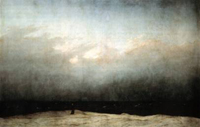
|

|
Thomas Mann claimed that Romanticism was "the most revolutionary and the most radical movement of the German spirit." While the term "Romanticism" is notoriously difficult to pin down, this course will provide an interdisciplinary introduction to Romantic literature, painting, music, and thought. Additionally, we will examine some of the social institutions that shaped the Romantic revolution in Germany: the university, the museum, the insane asylum, and the urban literary salon. The course will begin with a short exploration of the most important predecessors of Romanticism in Germany, Jean-Jacques Rousseau and Johann Gottfried Herder. Through close readings of literature and (what we today call) "theory", as well as encounters with painting and music, we will seek to go beyond the stereotype of Romanticism as a cult of irrational, emotional subjectivity by focusing on the following Romantic themes: the idea of irony as the art of thinking in contradictions and fragments, always delaying fulfillment; the aestheticization of philosophy; the definition of diversity as a progressive, universal mixing and melting together of all areas of artistic and scientific expression and knowledge; the discovery of the marginal, fantastic, surreal, and eccentric; the ideal of communal thinking ("symphilosophy") and creating ("sympoetry"); the invention of a German national self based on the rediscovery of medieval legends and folk stories; the figuration of unfulfillable longing in poetry and song. All readings are in English. Students have the option of reading some or all texts in German.
COURSE FORMAT: Seminar
Level: UGRD Credit: 1 Gen Ed Area Dept: HA GERM Grading Mode: Student Option
Prerequisites: NONE Links to Web Resources For This Course.
Last Updated on MAR-30-2006
Copyright Wesleyan University, Middletown, Connecticut, 06459